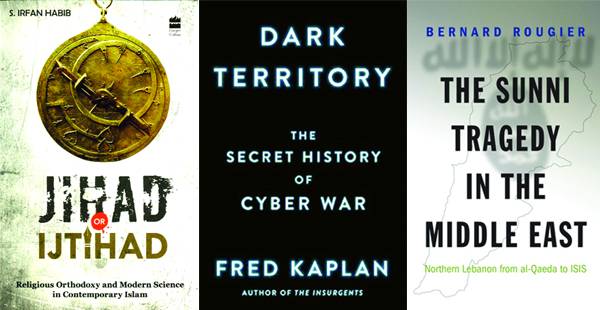
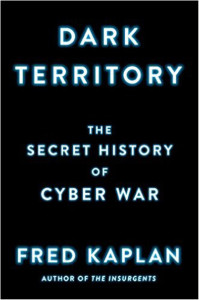
Dark Territory: The Secret History of Cyber War
Fred Kaplan
Simon & Schuster (paperback), 2016
PRs 1195
As cyber-attacks dominate front-page news, as hackers join terrorists on the list of global threats, and as top generals warn of a coming cyber war, few books are more timely and enlightening than Dark Territory: The Secret History of Cyber War, by Slate columnist and Pulitzer Prize–winning journalist Fred Kaplan.
Kaplan probes the inner corridors of the National Security Agency, the beyond-top-secret cyber units in the Pentagon, the “information warfare” squads of the military services, and the national security debates in the White House, to tell this never-before-told story of the officers, policymakers, scientists, and spies who devised this new form of warfare and who have been planning—and (more often than people know) fighting—these wars for decades.
From the 1991 Gulf War to conflicts in Haiti, Serbia, Syria, the former Soviet republics, Iraq, and Iran, where cyber warfare played a significant role, Dark Territory chronicles, in fascinating detail, a little-known past that shines an unsettling light on our future.
Reviews
“Chilling . . . Kaplan is one of America’s leading writers on national security, and his accounts of cyberattacks are gripping . . . assiduously researched.” (Edward Lucas The Times (London))
“Peppered with many fascinating behind-the-scenes anecdotes . . . A readable and informative history.” (P.W. Singer The New York Times Book Review)
A “Hot Type” Book Pick for March 2016 (Vanity Fair)
A “Hot Tech Book of 2016” (Tech Republic)
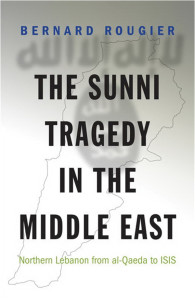
The Sunni Tragedy in the Middle East: Northern Lebanon from al-Qaeda to ISIS
Bernard Rougier
Princeton (hardcover), 2015
PRs 4350
Northern Lebanon is a land in turmoil. Long under the sway of the Assad regime in Syria, it is now a magnet for Sunni Muslim jihadists inspired by anti-Western and anti-Shi’a worldviews. The Sunni Tragedy in the Middle East describes in harrowing detail the struggle led by an active minority of jihadist militants, some claiming allegiance to ISIS, to seize control of Islam and impose its rule over the region’s Sunni Arab population.
Bernard Rougier introduces us to men with links to the mujahidin in Afghanistan, the Sunni resistance in Iraq, al-Qaeda, and ISIS. He describes how they aspire to replace North Lebanon’s Sunni elites, who have been attacked and discredited by neighboring powers and jihadists alike, and explains how they have successfully positioned themselves as the local Sunni population’s most credible defender against powerful external enemies—such as Iran and the Shi’a militia group Hezbollah. He sheds new light on the methods and actions of the jihadists, their internal debates, and their evolving political agenda over the past decade.
This riveting book is based on more than a decade of research, more than one hundred in-depth interviews with players at all levels, and Rougier’s extraordinary access to original source material. Written by one of the world’s leading experts on jihadism, The Sunni Tragedy in the Middle East provides timely insight into the social, political, and religious life of this dangerous and strategically critical region of the Middle East.
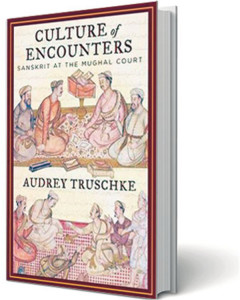
Culture of Encounters: Sanskrit at the Mughal Court
Audrey Truschke
Penguin Allen Lane (hardcover), 2016
PRs 1400
Culture of Encounters documents the fascinating exchange between the Persian-speaking Islamic elite of the Mughal Empire and traditional Sanskrit scholars, which engendered a dynamic idea of Mughal rule essential to the empire’s survival. This history begins with the invitation of Brahman and Jain intellectuals to King Akbar’s court in the 1560s, then details the numerous Mughal-backed texts they and their Mughal interlocutors produced under emperors Akbar, Jahangir (1605–1627), and Shah Jahan (1628–1658). Many works, including Sanskrit epics and historical texts, were translated into Persian, elevating the political position of Brahmans and Jains and cultivating a voracious appetite for Indian writings throughout the Mughal world.
The first book to read these Sanskrit and Persian works in tandem, Culture of Encounters recasts the Mughal Empire as a polyglot polity that collaborated with its Indian subjects to envision its sovereignty. The work also reframes the development of Brahman and Jain communities under Mughal rule, which coalesced around carefully selected, politically salient memories of imperial interaction. Along with its groundbreaking findings, Culture of Encounters certifies the critical role of the sociology of empire in building the Mughal polity, which came to irrevocably shape the literary and ruling cultures of early modern India.
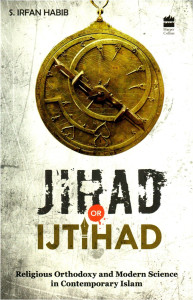
Jihad or Ijtihad: Religious Orthodoxy and Modern Science in Contemporary Islam
S. Irfan Habib
Harper Collins (paperback), 2013
PRs 598
While Europe was still stuck in the Dark Ages, scientists in the Islamic world were translating Aristotle, and making huge strides in astronomy, mathematics and philosophy. Two thousand years later, the idea of ‘scientific progress’ seems to be locked in a hopeless war with Islam. When and how did Islam lose its enthusiasm for the workings of the natural world?
S. Irfan Habib, one of the country’s foremost historians, traces the trajectory of how ‘mainstream’ Islam came to question modern science - beginning with the reformers of the nineteenth century and ending with present-day ideologues. Through the lives of famous men like Sir Syed Ahmed Khan and Maulana Abdul Kalam Azad, he demonstrates that the modern-day promulgation of Islam and its followers as ‘anti-modern’ and ‘anti-science’ is a myth that leads, quite literally, to explosives consequences. Habib also channels his scholarship to both history and Islam to question the controversial idea of ‘Islamic science’ as a category distinct from ‘modern’, ‘Eurocentric’ science.
In an engaging, easy style that belies the weightiness of the questions it seeks to answer, Jihad or Itijihad challenges both stereotypes and propaganda. This book places in perspective the relationship between Islam and science today.
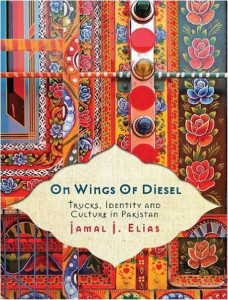
On Wings of Diesel: Trucks, Identity and Culture in Pakistan
Jamal J. Elias
Oneworld (hardcover), 2011
PRs 4995
Illustrated with beautiful colour photos throughout, On Wings of Diesel takes us on a journey through the fascinating world of Pakistani truck decoration. Ornately adorned and considered as “moving art”, these trucks—veritable roving exhibitions—depict all aspects of life and support a highly developed artisanal industry. Exploring the significance of this practice, Jamal J. Elias provides a unique window on Pakistan’s complex society that addresses complex questions of culture and religion in a way that is both accessible and entertaining. Jamal J. Elias is Professor of Islamic Studies and Chair of the Department of Religious Studies, University of Pennsylvania. The world’s foremost expert on Pakistani truck art, Elias is also a photographer who has held a number of solo and group exhibitions in the US.
Reviews
“What a pleasure to read, view, and ponder! Elias has made a major contribution to South Asian visual culture.” Andy Rotman, Associate Professor of Religion, Smith College
“A brilliant, solidly constructed study. This is a commanding work of scholarship.” David Morgan, Professor of Religion, Duke University, and Co-editor of the journal Material Religion
“At last a book that treats the emporors of Pakistan’s roads with the insight they deserve. Wonderful and engrossing.” Christopher Pinney, Professor of Anthropology and Visual Culture, University College London
“A phenomenal book. Sophisticated as well as lucid - and beautifully illustrated with the author’s own photographic work. I recommend it as the single most important contribution to the study of Pakistani society in recent scholarship.” Shahzad Bashir, Associate Professor of Religious Studies and Director of the Abbasi Program in Islamic Studies, Stanford University
“Well illustrated and very readable. Highly recommended not only for anthropologists, but also for students of Islamic art and as well as of visual and religious studies.” Juergen W. Frembgen, Senior Curator of the Oriental Department, Munich State Museum of Ethnology

